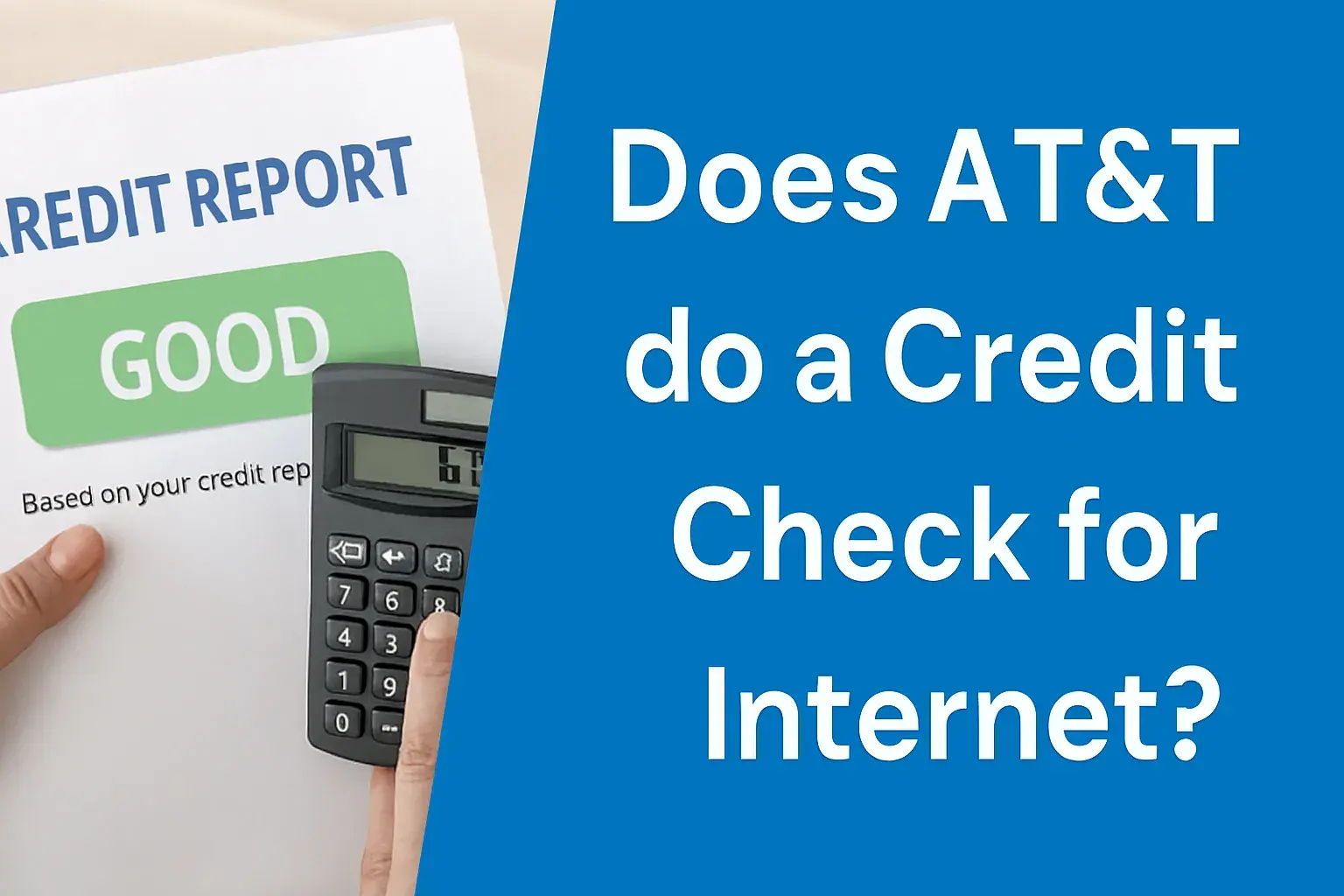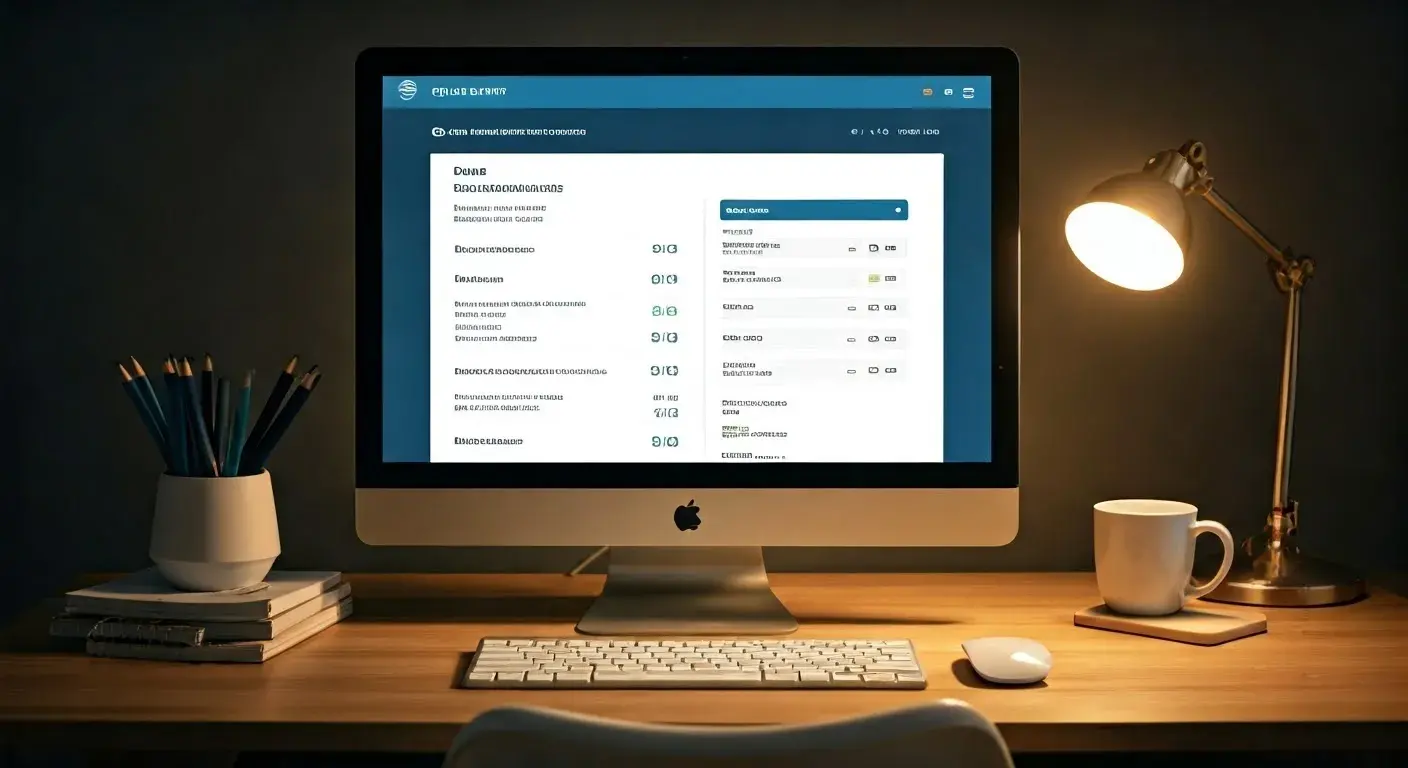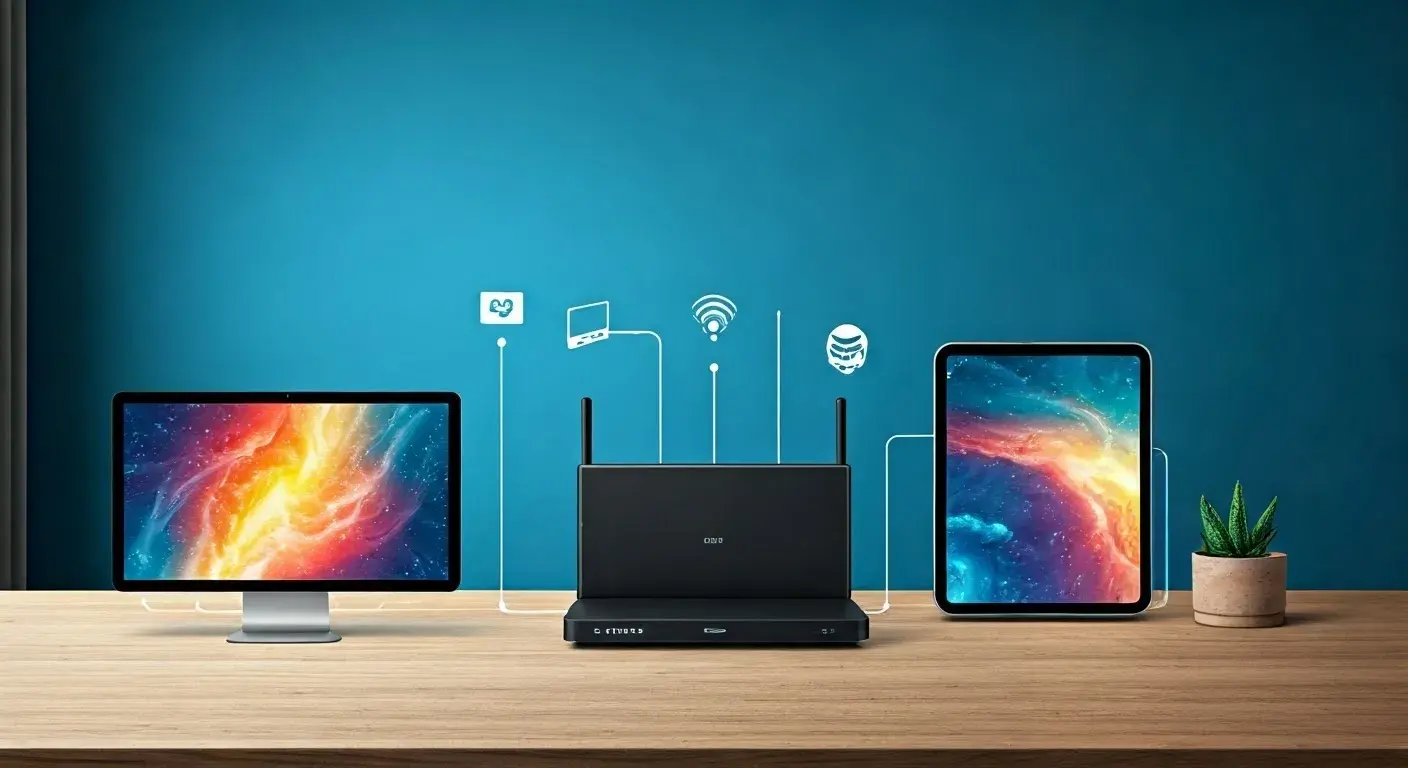Does ATT do a credit check for internet?

AT&T stands as a telecommunications titan in the United States, providing millions of homes with reliable fiber-optic and fixed wireless internet services. As you embark on setting up your new home connection, a critical question often arises during the application process: Does AT&T do a credit check for internet? This is more than just a procedural detail; it's a step that can significantly influence your approval, the upfront costs you face, and your eligibility for valuable promotional pricing.
Understanding the role of credit checks is crucial for new customers. It dictates whether you'll sail through the process with no deposit, be asked to pay a security deposit, or even need to explore alternative internet solutions. This comprehensive guide will demystify AT&T's credit check policy, explain why it's necessary, and provide actionable strategies for securing AT&T Internet service, regardless of your credit history. We'll cover everything from AT&T Fiber credit checks to no-credit-check alternatives, ensuring you have all the information needed to make an informed decision.
Does AT&T Do a Credit Check for Internet?
Yes, AT&T typically performs a credit check when you apply for postpaid internet service. This is a standard practice across major internet service Providers (ISPs), including competitors like Xfinity and Spectrum. When you submit your application for an AT&T Internet plan, whether it's their high-speed fiber service or traditional DSL, you are authorizing AT&T to review your credit history with one or more major credit bureaus (Experian, TransUnion, or Equifax).
This process is not designed to be a barrier but rather a standard risk assessment tool. The primary goal is to evaluate your financial responsibility and predict the likelihood of on-time payments. For the provider, installing equipment and provisioning service represents an investment. The credit check helps AT&T manage its financial exposure by identifying applicants who may pose a higher risk of defaulting on their monthly bills.
Why AT&T Requires a Credit Check
You might wonder why an internet provider needs to look into your financial past. The reasons are fundamentally business-oriented and are common across the industry.
-
Risk Assessment: The core reason is to assess financial risk. By reviewing your credit history, AT&T gauges how likely you are to pay your bills on time. A consistent history of on-time payments to other creditors suggests you will be a reliable customer.
-
Eligibility for Promotions and Bundles: The most attractive deals, such as discounted introductory rates, waived installation fees, and bundled services (Internet + TV), are often reserved for customers who meet certain credit qualifications. A strong credit score can be your ticket to significant savings over the term of your contract.
-
Equipment Financing: When you sign up for AT&T Internet, you are not just paying for a service; you are also leasing expensive equipment, like a modem/router combo unit. This equipment can cost hundreds of dollars. The credit check helps AT&T decide whether to extend this "loan" to you without asking for a substantial deposit up front
What Credit Score is Needed for AT&T Internet?
This is one of the most common questions, and the answer is intentionally vague. AT&T does not publish an official minimum credit score requirement for its internet service. They treat their specific criteria as proprietary information.
However, industry analysis and customer reports provide a general framework:
-
Good to Excellent Credit (670+ score): Customers in this range are most likely to be approved instantly without any required security deposit. They will also qualify for the best promotional offers and can typically bundle services without issue.
-
Fair Credit (580-669 score): Applicants with a fair credit score are often approved but may be required to pay a security deposit to initiate service. The amount can vary based on the exact score and the service tier chosen.
-
Poor/Bad Credit (Below 580 score): Approval for standard postpaid plans may be more challenging with a lower score. AT&T will likely require a significant deposit or may outright deny the application, suggesting their prepaid or alternative options instead.
It's less about a single magic number and more about your overall credit profile, which includes payment history, amount of debt, and length of credit history.
Does AT&T Fiber Require a Credit Check?
Yes, applying for AT&T Fiber requires a credit check as part of the standard approval process. In fact, because Fiber is often a premium service with higher speeds and associated equipment costs, the credit assessment might be just as stringent, if not more so, than for other AT&T Internet plans.
The outcome of the credit check directly impacts your Fiber installation:
-
Approval: Good credit leads to smooth approval, often with professional installation scheduled immediately.
-
Approval with Deposit: Fair credit may result in approval, conditional on paying a deposit before the installation technician is dispatched.
-
Denial: Poor credit could lead to a denial for postpaid Fiber service, prompting the need to explore alternatives like AT&T Internet Air or prepaid options.
AT&T Internet Air & Credit Checks
AT&T Internet Air, the company's fixed wireless internet service, represents a more flexible offering. While it still may involve an identity verification, the credit requirements are generally less stringent than for Fiber services.
As a newer product designed to compete in the flexible internet market, it sometimes functions similarly to a prepaid or no-contract service. While a soft inquiry might still occur, it's less likely to be a hard credit pull that impacts your score. The focus is more on providing service with simpler terms, making it a viable AT&T internet with bad credit solution.
Can You Get AT&T Internet Without a Credit Check?
For those seeking to avoid a credit inquiry entirely, there are limited pathways with AT&T.
-
AT&T Prepaid Internet: This is the most straightforward option. As a prepaid service, you pay for your internet before you use it, much like a prepaid phone plan. This eliminates the risk for AT&T, thereby negating the need for a credit check. Availability is limited, and plans may differ from postpaid options.
-
Paying a Deposit: If you fail the credit check for a postpaid plan, AT&T will often give you the option to pay a deposit. While this doesn't skip the credit check (it's the result of it), it is a way to get service after an unfavorable check.
-
Alternative Plans: Exploring other services like AT&T Internet Air (as mentioned above) or other ISP alternatives in your area that have more lenient policies.
AT&T Internet Deposits and Fees
If a credit check determines you are a higher-risk customer, AT&T will require a deposit to activate service.
-
Typical Deposit Range: Deposits typically range from $100 to $500, depending on the perceived risk and the cost of the service plan.
-
Refund Policy: The good news is that the deposit is refundable. AT&T will hold the deposit for a specified period (usually 12 months) of on-time payments. After this period, the deposit is typically refunded as a credit on your bill.
-
When Deposits are Waived: Deposits are routinely waived for customers with strong credit histories. They may also be waived for customers who enroll in automatic payments (AutoPay) and paperless billing, as this demonstrates a commitment to convenient and timely payments.
Does AT&T Run a Hard or Soft Credit Check?
For new customers, AT&T will almost always perform a hard credit check (also known as a hard pull). A hard inquiry is a full credit check that is recorded on your credit report and can temporarily lower your credit score by a few points. It occurs when a lender or service provider checks your credit to make a lending decision.
A soft credit check (soft pull) does not impact your credit score. AT&T may use a soft inquiry for existing customers who are upgrading their service or adding new lines. For example, if you already have AT&T wireless service and are now adding internet, they might use a soft pull based on your existing payment history with them.
Pro Tip: When applying, you can ask an AT&T sales representative whether the application will involve a hard or soft pull.
How to Qualify for AT&T Internet With Bad Credit
A less-than-ideal credit score doesn't automatically disqualify you. Here are strategies to improve your chances:
-
Be Prepared to Pay a Deposit: This is the most common outcome. Mentally and financially prepare for this possibility.
-
Opt for Prepaid Internet Options: Inquire directly about AT&T Prepaid Internet or the more flexible Internet Air plans.
-
Leverage Your Existing Relationship: If you are an existing AT&T mobile customer with a solid payment history (e.g., 6-12 months of on-time payments), mention this. They may use your internal history rather than a hard credit pull.
-
Use Autopay and Bank Draft: Enrolling in AutoPay directly from your bank account reduces risk for AT&T and can sometimes help waive a deposit requirement.
-
Improve Your Credit Score: If you have time, take steps to improve your score before applying: dispute errors on your report, pay down high credit card balances, and ensure all bills are paid on time.
AT&T Internet and No-Credit-Check Alternatives
If AT&T's credit requirements are a hurdle, it's wise to compare other providers. The market is evolving, with more flexible options emerging.
| Provider | Credit Check Policy | Deposit Range | Best For |
|---|---|---|---|
| AT&T | Hard Check for postpaid plans | $100 - $500 | Those with good credit seeking fiber |
| Xfinity | Hard Check | $50 - $200 | Wide availability, various plans |
| Spectrum | Soft Check (for most standard plans) | Varies | Those avoiding hard inquiries |
| T-Mobile Home Internet | Soft Check / No Check | None | Simple, unlimited 5G internet |
| Verizon 5G Home Internet | Soft Check / No Check | None | Easy setup, no contracts |
| Google Fiber | Hard Check | Varies | Ultra-high-speed fiber in select cities |
| Local WISPs | Often No Check | Possibly none | Rural areas, flexibility |
-
Spectrum is notable for typically using only a soft credit check, which doesn't affect your score.
-
T-Mobile Home Internet and Verizon 5G Home Internet primarily use soft checks for identity verification, making them excellent no-credit-check internet alternatives where available.
Impact of Credit Checks on Internet Customers
The result of your credit check directly shapes your customer experience:
-
Approval Process: A good score leads to instant approval. A marginal score can delay installation until a deposit is paid.
-
Financial Burden: A required deposit adds a significant upfront cost to getting connected, sometimes doubling or tripling the first bill.
-
Access to Deals: Without good credit, you might be locked out of the best promotional pricing, missing out on hundreds of dollars in savings over a year.
Tips to Improve Chances of Approval
-
Apply with the Strongest Applicant: If you live with a partner or roommate, have the person with the stronger credit history apply as the primary account holder.
-
Provide Accurate Information: Ensure your name, address, and Social Security number match exactly what is on your credit report to avoid delays or denials.
-
Consider Bundled Services: Sometimes, bundling internet with another service like wireless can strengthen an application based on an existing relationship.
-
Call and Speak to a Representative: Sometimes, explaining your situation or asking about alternatives over the phone can yield more options than the online application portal.
AT&T Internet for Students, Military, and Seniors
AT&T offers specific programs that can help mitigate credit concerns for certain groups:
-
Military: Active-duty personnel and veterans may have deposits waived or be eligible for special discounts.
-
Students: While not a direct credit waiver, students can explore special offers or use a parent as a co-signer on the account.
-
AT&T Access: This is a critical program. AT&T Access is part of the Affordable Connectivity Program (ACP) government benefit program. It provides low-cost internet to qualifying households. Enrollment in ACP typically does not require a credit check, making it the best option for low-income households with poor or no credit history.
Future of Credit Checks in the ISP Industry
The industry is slowly shifting towards more customer-friendly access. The rise of 5G home internet from T-Mobile and Verizon, which largely foregoes traditional credit checks, is forcing established players to adapt. AT&T's own development of AT&T Internet Air is a response to this trend. We can expect a continued growth in flexible, prepaid, and no-contract options that reduce reliance on strict credit scoring, making internet access more equitable.
Conclusion
So, does AT&T do a credit check for internet? The definitive answer is yes. This standard practice is a key part of their customer onboarding process for postpaid fiber and internet plans. The outcome of this credit inquiry directly influences your approval, the upfront deposit required, and your access to the best promotional deals.
However, a less-than-perfect credit score is not a dead end. Pathways like paying a refundable deposit, opting for AT&T Prepaid Internet, or exploring innovative services like AT&T Internet Air can bridge the gap. Furthermore, government-assisted programs like AT&T Access provide vital options for those who qualify.
Before you apply, assess your credit health, research your local options, and determine the best fit for your financial situation. By understanding AT&T's policies and the available alternatives, you can confidently navigate the process and secure the high-speed internet service your home needs. Check AT&T Fiber Plans and availability in your area to get started.
Faq
Q1: Does AT&T check credit for internet service?
A: Yes, for most of their postpaid internet plans, AT&T will perform a credit check as part of the standard application process.
Q2: Does AT&T Fiber require a credit check?
A: Yes, applying for AT&T Fiber involves a credit check to determine approval and whether a deposit is required.
Q3: What credit score do I need for AT&T internet?
A: AT&T does not publish a minimum score, but customers with scores above 670 generally have the easiest approval with no deposit. Scores below 580 may face challenges.
Q4: Does AT&T require a deposit for internet?
A: It depends on your creditworthiness. Customers with good credit typically do not need a deposit, while those with fair or poor credit will likely be required to pay one.
Q5: Is AT&T Internet available without a credit check?
A: Yes, through their AT&T Prepaid Internet option (where available) or through the AT&T Access program for low-income households. The AT&T Internet Air service may also have less stringent checks.
Q6: Does AT&T do a hard or soft credit check?
A: For new customers, it is almost always a hard credit check, which can temporarily affect your score. Existing customers upgrading service may only receive a soft pull.
Q7: Can I get AT&T Internet with bad credit?
A: Yes, but you will likely need to pay a security deposit. If your credit is very poor, you may be directed toward prepaid options or alternative providers.
Q8: How much is the AT&T Internet deposit?
A: Deposits typically range from $100 to $500, depending on your credit history and the chosen service plan. It is refundable after approximately 12 months of on-time payments.
Q9: Can students or military personnel skip the credit check?
A: They cannot "skip" it, but they may qualify for programs that waive the resulting deposit. Military personnel should inquire about active duty and veteran benefits.
Q10: Does AT&T Prepaid Internet require a credit check?
A: No. Since you pay for the service upfront, there is no need for AT&T to assess your credit, so no check is performed.





